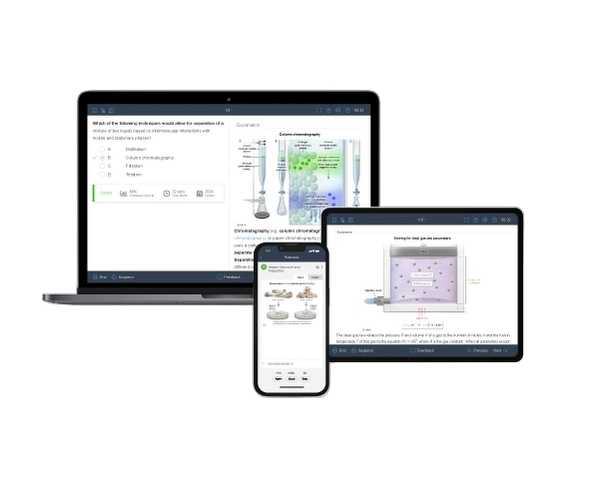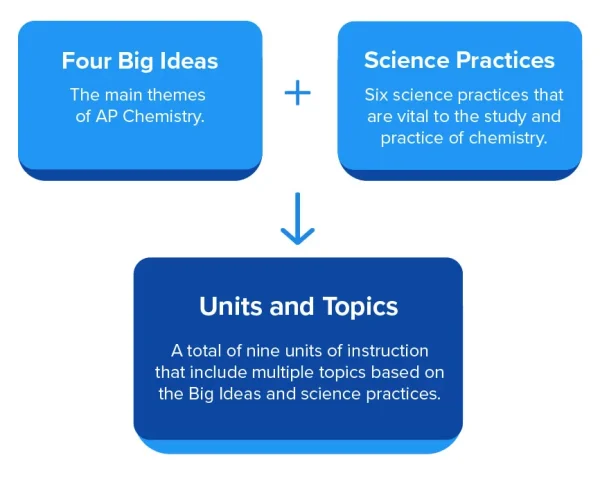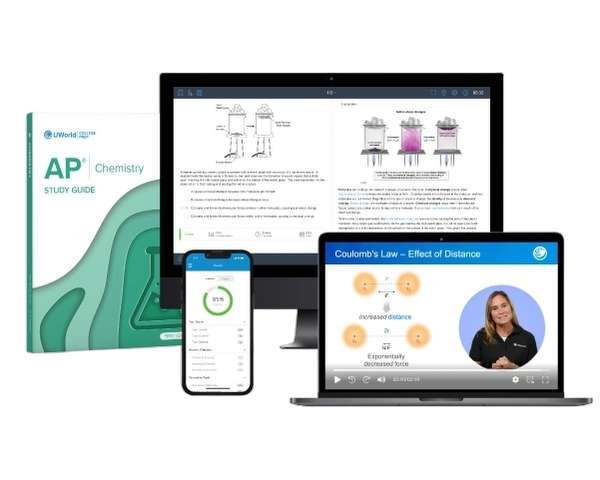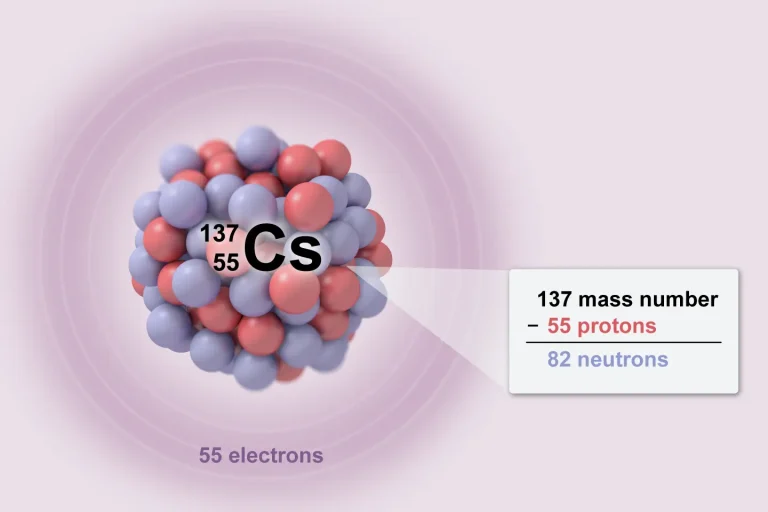The AP® Chemistry exam has 2 main sections — a multiple-choice section (Section 1) and a free-response section (Section 2), each accounting for 50% of your final score. You'll be provided with a formula sheet and a periodic table chart. You'll also be allowed to use a scientific or graphing calculator on both sections.
Here is a breakdown of the AP Chemistry exam structure:
| Question Type | Number of Questions | Score Weight | Total Time |
|---|---|---|---|
| Multiple-Choice (MCQ) | 60 | 50% | 1 hour 30 minutes |
| Free-Response (FRQ) | 7 | 50% | 1 hour 45 minutes |
Section 1: Multiple-Choice Questions
The MCQ section consists of 60 questions to be completed in 1 hour and 30 minutes. These questions test your knowledge of the various units in AP Chemistry and your science practice skills. Questions in this section may be either individual multiple-choice or sets based on a given passage with 4 answer choices.
Given the total time you will have to complete this section, you would want to read and answer each question within 1 minute and 30 seconds to give yourself extra time at the end of the exam to review your answers. There is no scoring penalty for getting answers wrong, so give every question a shot, even if it's guesswork.
Questions in this section will test your knowledge of the 9 units comprising the AP Chemistry curriculum. Here is the weighting for each unit:
| Units | Unit Name | Weight |
|---|---|---|
| Unit 1 | Atomic Structure and Properties | 7-9% |
| Unit 2 | Molecular and Ionic Compound Structure and Properties | 7-9% |
| Unit 3 | Intermolecular Forces and Properties | 18-22% |
| Unit 4 | Chemical Reactions | 7-9% |
| Unit 5 | Kinetics | 7-9% |
| Unit 6 | Thermodynamics | 7-9% |
| Unit 7 | Equilibrium | 7-9% |
| Unit 8 | Acids and Bases | 11-15% |
| Unit 9 | Applications of Thermodynamics | 7-9% |
The exam will also test your science practice skills. While there are 6 science practices, the third science practice — Representing Data and Phenomena — will not be tested in this section. Here's the weighting of each science practice:
| Science Practice | Weight |
|---|---|
| Models and Representations | 8-12% |
| Question and Method | 8-12% |
| Model Analysis | 23-30% |
| Mathematical Routines | 35-42% |
| Argumentation | 8-12% |
Consider how each practice is weighted when you work out your study plan for AP Chemistry. You'll be able to decide how much time to spend on each unit and practice accordingly. This way, you'll be better prepared for the exam.
Learn more on how to approach AP Chemistry multiple-choice questions.

Section 2: Free-Response Questions
You will have 1 hour and 45 minutes to complete Section 2 of the AP Chemistry exam. You'll be expected to answer 3 long essay questions and 4 short-answer questions. They usually come in sets of 2 or more. You should ideally be able to answer short-answer questions in 5 to 10 minutes and long essay questions in 15 to 20 minutes. This approach provides time to review your answers and address any questions you may have left unanswered or unfinished.
The long essay questions in this section are worth 10 points each, while the short-answer questions are worth up to 4 points each. This second section will also test your knowledge of the content taught in the 9 units of AP Chemistry. However, unlike the previous section, which only tests 5 of the 6 science practices, this section will test your skills in all 6 science practices.
Let's take a look at the weight distribution of each of the science practices in this section.
| Science Practice | Weight |
|---|---|
| Models and Representation | 2-4% |
| Question and Method | 10-16% |
| Representing Data and Phenomena | 8-16% |
| Model Analysis | 5-9% |
| Mathematical Routines | 43-53% |
| Argumentation | 15-24% |
Answering free-response questions takes practice. It's also essential to learn how to approach these questions correctly. Since you will need to draft your own answers, learning to frame them to include the relevant information and science practices is crucial. To help you better prepare for this section, we've put together some tips and pointers in our article on how to approach AP Chemistry free-response questions.
What Do You Need to Study to Ace AP Chemistry?
The syllabus for AP Chemistry rests on 2 foundational aspects — the 4 Big Ideas and the 6 science practices. The entire course contains 9 units, with multiple topics in each unit. Each unit covers 1 or more of the Big Ideas and science practices.

To do well on the exam, you must design a study plan that covers all 9 units of the syllabus. Keep the AP Chemistry exam format in mind when creating your study plan. The weight of the science practices in each section indicates how much time you will need to spend on each unit.
Is AP Chemistry a Digital or Paper-and-Pencil Exam?
The AP Chemistry exam is a hybrid digital. The MCQ section will be taken in the Bluebook testing app, and answers to the FRQ section must be handwritten in the paper booklets.
Get all the prep you need to study smarter for your AP Chemistry course and exam. Check out our AP Chemistry online course, which includes a comprehensive study guide, an extensive question bank with hundreds of questions, detailed answer explanations, vivid illustrations, and digital study tools such as flashcards and notebooks to help you improve your retention of concepts.

References
- Course Overview. AP Chemistry. (n.d.). apcentral.collegeboard.org. Retrieved March 24, 2025 from https://apcentral.collegeboard.org/courses/ap-chemistry
- Exam Overview. AP Chemistry. (n.d.). apcentral.collegeboard.org. Retrieved March 24, 2025 from https://apcentral.collegeboard.org/courses/ap-chemistry/exam
Read More About the AP Chemistry Exam
Planning to prepare for AP Chemistry? Check out UWorld's Guide to AP Chem Exam Info, which clearly explains what's on the exam, why to take AP Chem, prerequisites, and more!
AP Chemistry Course and Exam DescriptionAre you looking for an easy-to-understand AP Chemistry Course and Exam Description? Check out this curriculum guide for in-depth info on the units, topics, skills, and more.
AP Chemistry Scoring GuideEverything you need to know about the AP Chemistry exam scoring system and score distribution - including the AP Chemistry exam score calculator, to know where you stand.
AP Chemistry Study Plan & TipsAre you looking for pro-tips that will help you score a 5? Check out our expert's guide and resources to help you score high in AP Chemistry exam.
Best AP Chemistry Study Guide ComparisonCompare the best AP Chemistry study guides! See how Kaplan, Barron's, and Princeton Review stack up against UWorld for comprehensive exam prep.
Best AP Chemistry Prep Course ReviewSearching for top AP Chemistry prep courses? Read this review to compare the best courses and choose the perfect one for your success.




